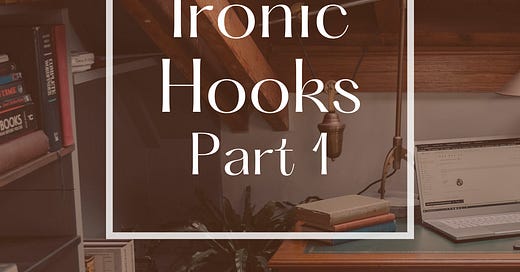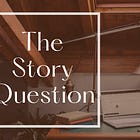This past summer, I critiqued quite a few manuscripts about women who find themselves in a romantic relationship with someone famous. It’s such an exciting premise, and I’m always anxious to find out how dating an actor, a musician, a model, etc. will lead to interesting complications. But I soon find that this hook isn’t enough to sustain a whole novel.
In fact, a lot of early drafts of novels feature weak hooks. “Woman dates a famous person” is something that has been written so many times that each book starts to feel quite a bit like the others. More than that, this premise is too general to help us understand the main character, who often feels like a self-insert.
I also critiqued YA manuscripts over the summer that were fast-paced, featured likeable heroines, and used lovely prose. But they had the same premise, one I see all the time on store shelves: a young woman must fight dark forces to claim her throne. The same goes for mysteries I’ve critiqued—they all seem to have a similar hook: jaded person must solve shocking murder.
That doesn’t mean you should stop writing romances about famous love interests or YA novels about warrior-queens or mysteries about jaded detectives! It just means that you need to add an ironic twist to your hook, one that will differentiate your novel from others and will allow for a more in-depth exploration of your main character.
Today, we’ll look at how to add an ironic twist to your novel’s hook; next time, we’ll look at how to add a complication to your hook at your novel’s midpoint. In a future post, we’ll look at how to make the most of your hook by fully exploring your premise.
Love Stories In Which Love Feels Impossible
Consider the difference between this hook:
A woman starts a romantic relationship with a member of a famous boy band.
And this one:
A forty-year-old woman starts a romantic relationship with a twenty-four-year-old member of the famous boy band her daughter adores. (The Idea of You by Robinne Lee)
The first hook lets us explore some exciting situations. What is like to have a famous singer dedicate a song to you? How does it feel to go on a date while everyone is looking at you and taking pictures of you? How do you remain confident in your relationship when your partner gets constant attention from other women? But these situations don’t necessarily reveal much about the main character. They only show us what it’s generally like to date a famous person.
The second hook gives us the same situations to explore and adds new dimensions. What is it like to have a famous singer dedicate a song to you—considering that might be your own daughter’s dream? What does it feel like to get so much attention—considering you have your own equally successful career that doesn’t get as much applause? How do you remain confident in your relationship—considering the women who often throw themselves at your partner are younger and hotter than you?
I often see hooks for romance novels that focus entirely on the love interest (he’s famous, he’s rich, he’s a professional rival). And my response is, Yes, but what does that have to do with the main character? He’s famous—and she’s far too shy even to use social media, let alone be seen in public with him. He’s famous—and she’s a reporter who writes snide things about celebrities (including him) for her popular website. He’s famous—and she can’t reveal that she’s the author of the book his latest movie is based on. (This last one is from a really fun manuscript I recently read!)
What is it that makes these people two absolutely wrong for each other? That’s generally the ironic twist, because of course there’s also a reason they’re absolutely right for each other.
Thrillers In Which Danger Feels Inescapable
Consider the difference between this hook:
A DA must investigate the murder of a fellow DA.
And this one:
A DA must investigate the murder of a fellow DA, with whom he was secretly having an affair—making him the number one suspect. (Presumed Innocent)
The first hook doesn’t seem very different from any other murder mystery, except that the investigation will probably more emotional considering the DA knew the victim.
But there’s something instantly exciting about a DA as the prime suspect. The danger to our main character feels more immediate. His political rivals will be eager to pin the murder on him and will have all the tools to do so. His friends who have the skills to clear his name will instead suspect him. His coworkers who would usually provide him with clues will now feel pressured to reveal his past breaks from procedure. Even his family might turn on him, knowing he hasn’t been loyal to them.
What brings danger closer to home for the main character? What makes this case seemingly impossible to solve—and why is our main character especially equipped to solve it? Why is the main character the worst—and best—person to find an escape from this terrible situation? The answer to any of these questions provides irony that allows the character to be the focus of the story.
Situations vs. Characters
Sometimes, irony is found in the novel’s situation, whereas sometimes it’s found in the novel’s main character.
Let’s first look at an ironic twist to a situation. Consider the difference between this hook:
A young knight in Camelot must prove himself in order to gain a spot on the Round Table.
And this one:
A gifted young knight arrives at Camelot to compete for a spot on the Round Table, only to find he's too late. (The Bright Sword by Lev Grossman)
Proving yourself to the knights of Camelot is difficult and could lend itself to an interesting plot—but we’ve seen this story many times. A tweak to the situation provides irony that makes for heartbreak, humor, and intrigue. How will the main character fulfill his talent if there are no more battles to fight? How will he find his place in the world if the Round Table is all but disbanded? How will he prove himself noble if there is no more force for good against evil?
Here’s an example of how to introduce irony through a twist in the main character. Consider the difference between this hook:
A girl must embark on a quest to cure herself after she’s cursed to become a demon.
And this one:
A girl who has always longed to be normal is cursed to transform into a demon, but when she embarks on a quest for a cure, she must decide whether returning to a quiet life is worth giving up her newfound power. (A Thousand Steps Into Night by Traci Chee)
Both of these versions of the story will follow similar plots in that they’ll both require a quest full of dangerous tests, magical characters, and intriguing secrets. But the second version presents a seemingly impossible choice that will reveal the depths of the main character. Would she rather be ordinary—and powerless? Or powerful—and a demon? (Please read this book, I love it.)
It Might Take Time For Your Hook To Emerge
If you’re hoping to write a highly commercial novel, it makes sense to create the best hook possible before you draft your story. But generally, it’s okay to try out your story first and then, in later drafts, to look for elements to lean into so that you can exaggerate the irony. If you have no idea what your novel’s hook might be, or if you can’t see a way to create an ironic twist just yet—don’t worry about it! Keep writing and see what emerges. By the end of the draft, you might better realize what kind of story you’re trying to write, and you can then play with your hook until it makes clear a path for revision.
For literary novels, hooks aren’t necessarily needed. Instead, the strength of the prose and pf the character complexities provide a hook. But even a small tweak can provide an intriguing hook for a character-focused story. Consider the difference between this hook:
A sweeping novel about the lives of different people throughout the history of New England.
And this one:
A sweeping novel about a single house in the woods of New England, told through the lives of those who inhabit it across the centuries. (The North Woods by Daniel Mason)
I’m somewhat interested in reading a novel about how people lived at different times in American history, but the fact that all the people in The North Woods lived in the same house (in different years) made me buy the book the instant I read about this premise. I couldn’t wait to find out how the house would change over the years, why different people would want to live here, and how the house would link together very different lives.
If a big, ironic hook doesn’t fit your novel, that’s okay! A smaller twist is far better for some stories. But… you have to be honest with yourself about the fact that if you’re writing a highly commercial novel or if you’re writing in a genre with a saturated market (i.e. rom coms), you need a hook that sets your story apart from others.
In fact, I think this is why writers often feel frustrated about not getting much tractions with agents when they send out their query letters; they know they’ve written a good story, but they don’t realize they’ve written an already-familiar story, one that could stand out with changes that explore a more interesting angle. I often hear writers say that the publishing world wants to force their book into a mold to make it more marketable, when in fact the opposite is true—agents and editors are looking for stories that provide a unique twist on the familiar. It might be true that it’s hard to promote a completely unique book that’s very different from what readers are used to, but it’s also true that you can’t successfully promote a book that’s exactly like every other book in its genre.
Your Turn
If you want to craft a hook with an ironic twist, try asking yourself these questions:
How can my novel’s situation best exploit my main character’s specific vulnerabilities?
What special skill or flaw makes my character different from other main characters in my novel’s genre?
What common thread brings together different characters or situations in my novel, and how can I better highlight that thread?














great advice. thank you.
Had to restack. You hit it right on the nose. I can only read so many post apocalyptic, climate change, viral attacks, girl finding out she has powers… Such an amazing thing to write a book, but MUST find a way to make it stand out.